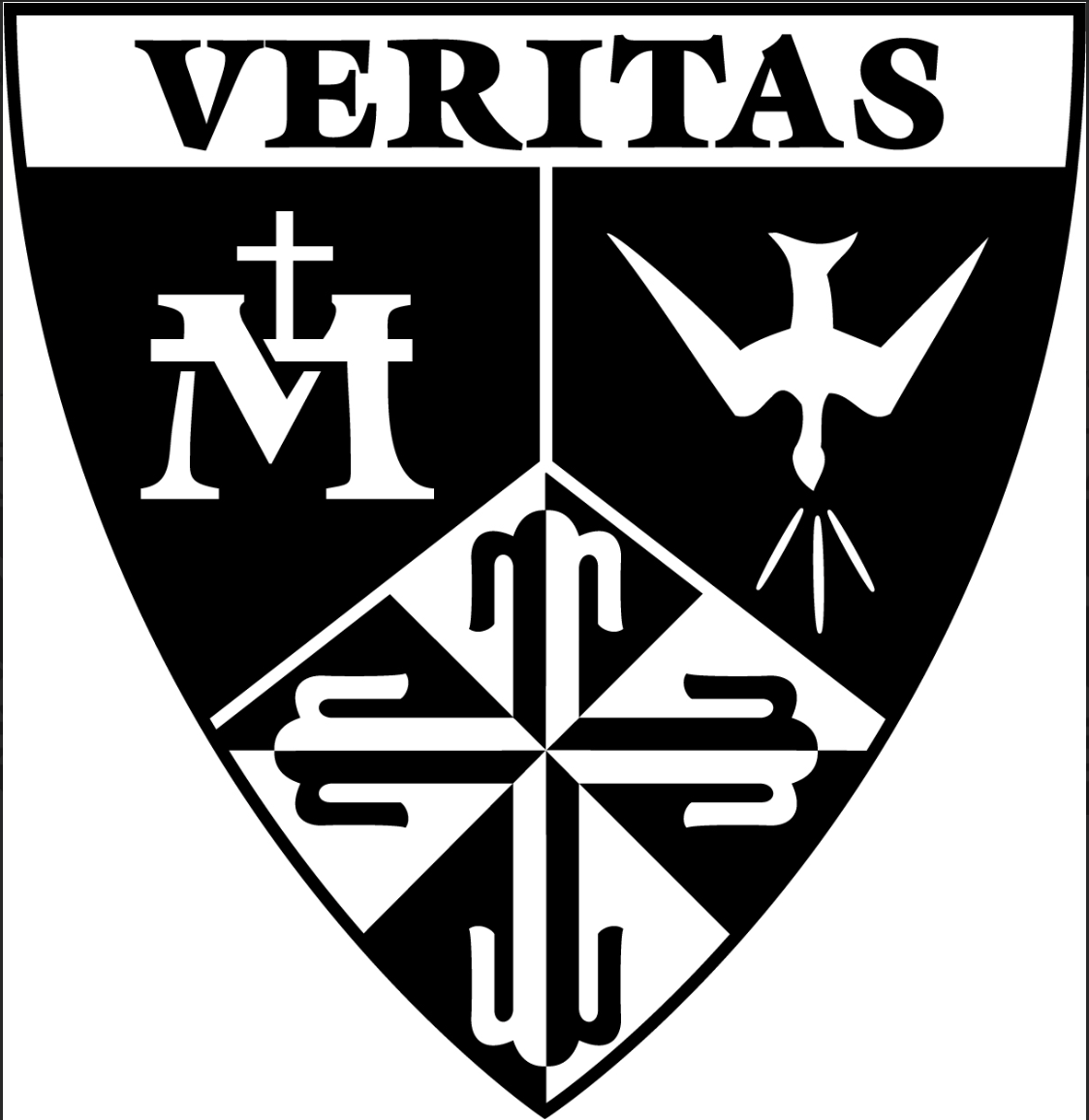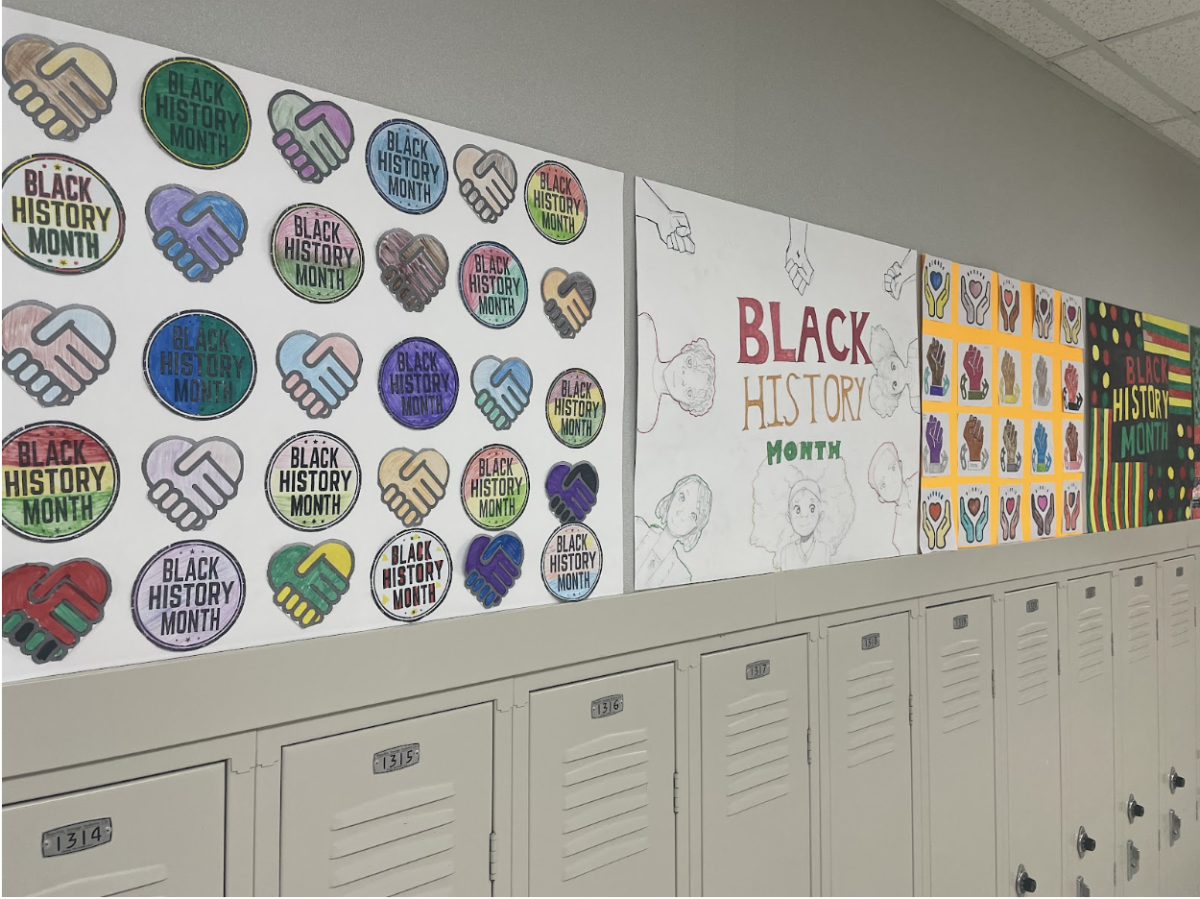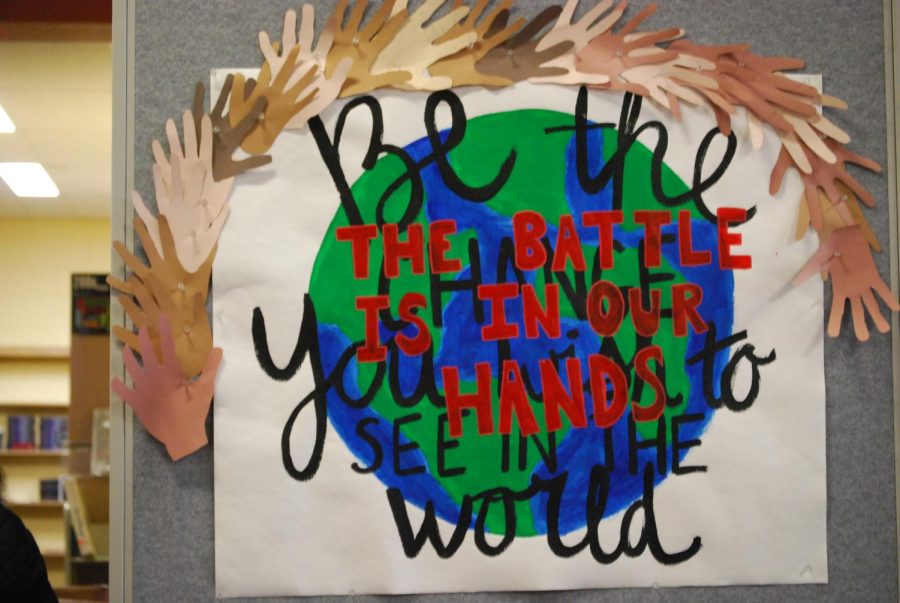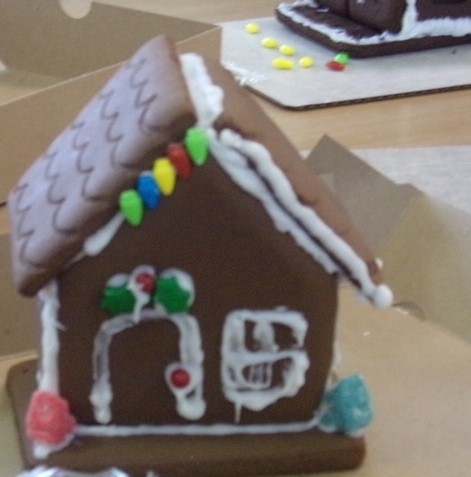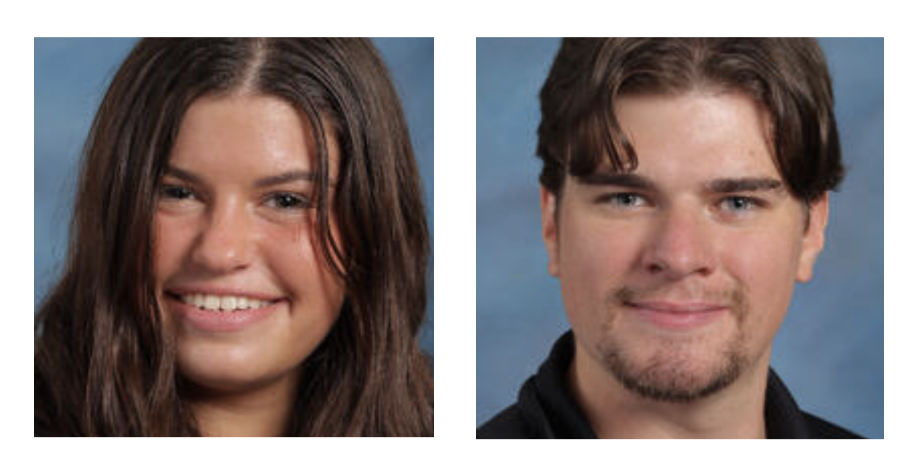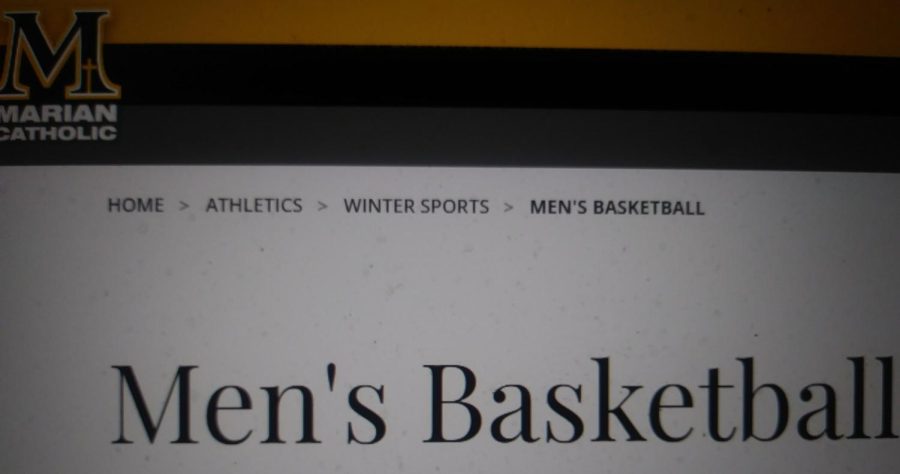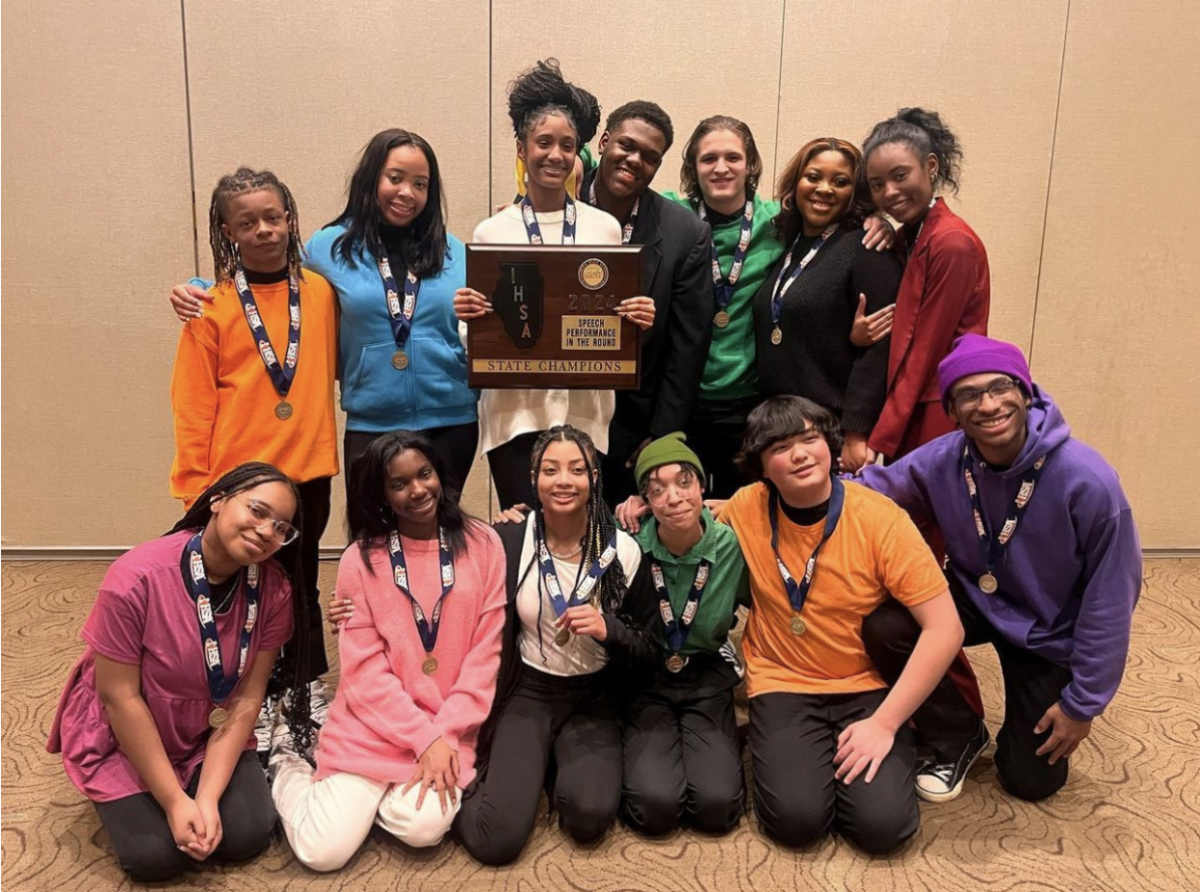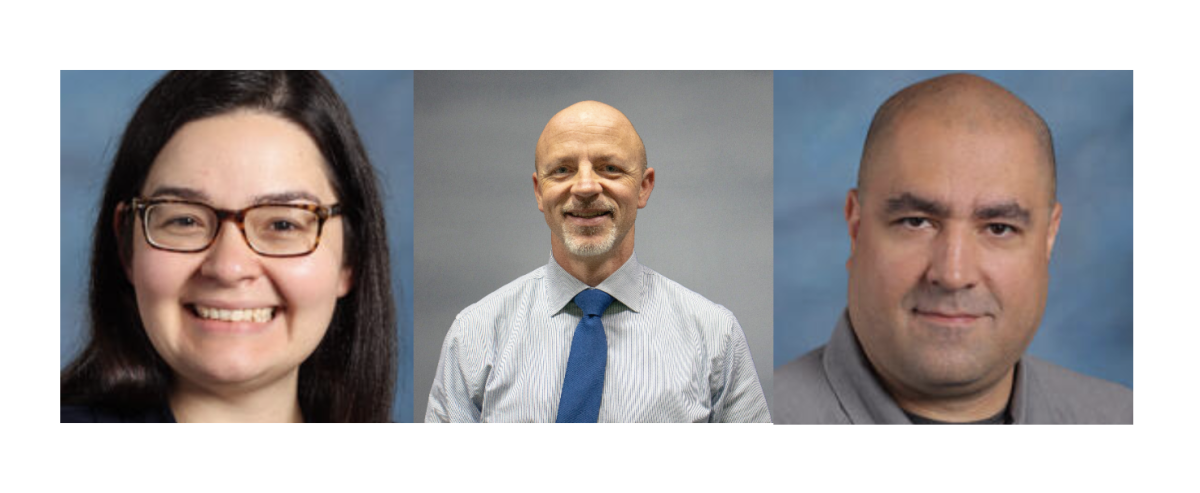After Mr. Tortorello’s departure in 2022 and one year-long search for Marian’s principal, our principal search committee landed on one gem tucked within our own alumni: Dr. Joe Zampillo.
Dr. Zampillo has 28 years of experience in education as a social studies teacher, director of recruitment and admissions, middle school dean of students, middle school assistant principal, and school principal. He completed his bachelor’s degree in teaching at the University of Illinois Chicago, his master’s in education leadership at DePaul University, and his doctoral degree at Governors State University, bringing his wisdom back to Chicago Heights.
Mrs. Zerante has a bachelor’s degree in English Literature and Secondary Education from Loras College and her Master’s in educational leadership from Concordia University Chicago. She was the English Department Chair, an English teacher, and the Head Varsity Softball Coach at Marian, building this school up and paving her way through. After 8 mighty years in the classroom, Mrs. Zerante is our new assistant principal.
The goal of this interview was to hear the top priorities for this school year and dive into their guiding principles.
Throughout the interview, Dr. Zampillo and Mrs. Zerante are smiling, comfortable, and thoughtful about their responses. Dr. Zampillo’s eyes almost shut when he smiles, which he does often. They listen intently to each other, and me. Despite their focused approach, they are not afraid to laugh. Truthfully, their charisma made this interview feel more like a conversation. Often referred to as Team Z, I would declare this nickname a symbol of their friendship and partnership: as close in dynamic as a real Olympic team.
We walk through the Wrubel Center into the quiet room, often used for speech prep and meetings. I sit down, directly in front of Mrs. Zerante on my left, and Dr. Zampillo on my right. They sit adjacent to each other.
I begin, “Thank you all for coming. I’ll be recording this interview, then it will be in the Spartan Star lightly edited for clarity and flow.”
“My first question is: what is one word to describe the school year so far?”
They’re both a little surprised. Mrs. Zerante smiles and chuckles, visibly searching for her answer. “That’s a good one. I’m gonna go with… hopeful. School years are unique. Every school year is unique with what you confront. For me, moving out of the classroom and into the administrative role, I’ve been able to see things from a different perspective. And, that has been good for me; that has been very enriching for me to see it from this way. And I think when things have come up, I’ve tried to keep a mindset of ‘This is an opportunity to make something stronger or better,’and so I try to keep that perspective as we go through. With most scenarios, even when it’s been something challenging, there’s still a regard of ‘Okay, this is an opportunity,’ so that’s why I would say hopeful.” She finishes her sentence, turning to Dr. Zampillo.
Dr. Zampillo smiles, and says, “I’m gonna say… rejuvenating. I’m new, obviously. Coming from a long experience as an educational administrator, and to come into a school environment to work with so many teachers who are so dedicated to the students here and the school community and they truly have the best interest of the students and the school community as a priority, who know why they are here and what they are doing, I find it very rejuvenating.”
He keeps talking, growing more excited, “And the quality of the students here, I find very rejuvenating after the experiences I’ve had leading up to this point. We have good kids— good human beings— who want to connect with adults in a positive way. To see the relationships that are here, and strong between the students and the staff and those caring relationships feels rejuvenating, in terms of my career. And I want to make sure, I want to be dedicated as a leader here, serving and leading a school community to make sure that it stays that way. You get into the grind of the school year and challenges come up, and all those things, my job is making sure it stays that way. It felt that way starting the school year, and I feel it’s our responsibility to keep it that way.”
“That’s great,” I say. “My second question is: as alumni of the school, how do you think your experience as former students shapes your leadership approach now as administrators?”
Mrs. Zerante begins, “We talk a lot about the tradition of excellence here at Marian Catholic. Dr. Zampillo and I are both products of that excellence. That long history of service and community outreach, you know, Marian has that. It’s a cornerstone of the community and a beacon for those values. So, for me, as the student to teacher to administrator, a big part of this work is maintaining that and providing that space for students to have that same level and ability to meet those high levels of success that I had the privilege of learning as a student here.”
She continues, more relaxed, “— and that you go off into the world and set the world on fire with your amazingness—,” she smiles, “that’s definitely a bit of it for me. And to make it in a way that works for our students now, for any student that’s coming through our doors has that opportunity— that tradition. Does that make sense?”
“Yeah, absolutely,” Dr. Zampillo says, nodding.
He leans forward, a little closer without changing his tone. He inhales, and in an unexpected personal moment, he reveals, “I’m gonna share a secret with the entire student population, that some know, some don’t: I was on academic probation my freshman year.”
He sits back up, “And I’d overcome that, but I tell that story because that experience is why I’m an educator, and why I’ve gotten into education and educational leadership because I do truly believe if I didn’t come here, and wasn’t put on academic probation, and didn’t have the opportunity to be in the band—which was also a motivator of why I didn’t want to get kicked out. It really changed me and who I was as a student.”
Looking more pensive, he says, “The great thing about it is that when that happened, the teachers were so supportive. I was not on my own. Even though I had gotten myself into that pickle, for lack of a better way of putting it, when they saw that I wanted to turn it around, I got good help and support from the caring teachers here. That ultimately made me want to be an educator and to make sure that I’m in school environments that never give up on students, even the ones who are struggling. If you could find a way to connect with them, you can find a way to help them learn, grow, be successful, and overcome their own limitations.”
He breathes in, and thinks some more. “So I think that’s my connection. That’s my story of Marian Catholic, and why I’m an educator, and why it’s exciting to be back here in order to give back in that way.”
“And you have my permission to tell the whole entire student population that I was on academic probation,” he laughs.
“It’s all the record,” Mrs. Zerante says, laughing.
I say, “That’s a really enriching story, I think. I rarely get to hear why educators come into education. The most common story is ‘my parents were educators,’ which is true for me too. But yeah, really nice story.”
“My next question is, what are the most significant changes you’ve noticed at the school since you graduated, and how do you plan to build on those changes?”
They both look up towards the ceiling, visibly thinking through their responses. “That’s a— That’s a big question, Rainey. I’ve gotta think about that for a second,” Mrs. Zerante says.
Dr. Zampillo begins, “I can jump in a little bit while you’re thinking about it. Coming from the way back machine,” he laughs, “graduating in 1989, there’s a lot of changes. I think they’re good changes that are reflective of our society, but demographically. It’s a more diverse student environment than when I went here. Also, religion. When I went here, the majority of the population was Catholic. Now, I believe the majority is non-Catholic.”
“In terms of opportunities, when we talk about striving to create a more unified world, settings, and spaces for people, what a great opportunity we have here with the changes that have happened. We have to make sure that we’re carrying out our mission as a Catholic high school in a way that’s inclusive to the diversity that is here, in all types of ways, that aligns with teachings of Jesus. You know, Jesus reached out to everybody. I think this is an opportunity to model what Jesus did, but in a different way, because it’s such a different, diverse group.”
He pauses, then continues, “With that, the needs of the students have changed too. We have to make sure that we’re attuned to that, meeting students where they are and helping them be successful and college ready when they leave here. Even if they’re not going to college, meeting them where they are takes on different meanings now because they’re coming from a variety of different backgrounds, experiences, and abilities than even when I was here. That can be a good thing. That’s our mission. That’s what we’re all about.”
Mrs. Zerante nods in agreement, and says, “That’s really good. I agree with all of what Dr. Zampillo said, but I would add the layer of a new holistic approach to education. It’s become a big part of our conversations right now with meeting students where they’re at. Like we’ve talked a lot—”
She opens her palm and gestures to me, “—Even your research project is about social-emotional learning, and that’s new for me and the experiences I’ve had here. We’re having these conversations, and we’re thinking more about those diverse needs from students, whether that be academically or social-emotionally, how we can get those incorporated into our classrooms more fully.”
“And that’s going to be a place where Dr. Zampillo and I want to build partnerships between students and administrators and teachers, so students feel like they have a space to voice what they’re experiencing. That’s something Dr. Zampillo has done in his career prior to coming here, which I’m excited to learn and incorporate even more. That’s going to be key to how we move forward.”
She nods, and leans back in her chair.
“That’s great. That’s really great,” I say. “This is similar to question two, but what values or traditions from your time as students do you hope to preserve or bring back to the school community? That can be as students, as athletes, as band members too, from anything about growing up in this community.”
They listen, nod, and think of a response.
“We really believe every kid is a leader in their own way and right,” Mrs. Zerante says. “That leadership can take different styles too. I learned how to lead within myself and what that looked like for me may look different for someone else, and that was okay. We needed that variety to have a successful community. Then, we brought those out into the world. I’d like to see that mentality become fully present and a part of the work we’re doing.”
“I think about our Emmaus programming and what that program was in the past, what it’s shifted to, and what we can do— whether it be change, refocus, or shift to center that leadership mentality back into our work here. That can be daily, or a couple times a week— whatever it might look like structurally. I’d love for students to be engaging in that more because that was something very unique to my time here as a student. It’s what made me confident and comfortable.”
Dr. Zampillo listens intently, and begins, “To dovetail off of that, going back to my time here, and connecting to what I said earlier, I wouldn’t be where I am today without Marian Catholic. To be part of something bigger than yourself, and understanding that if you buy into that, that’s where your leadership piece comes in.”
“Leadership isn’t always about being the most charismatic or even leading a group of people. It’s about what you’re doing to contribute to something greater than yourself that’s a benefit for a greater community,” he says.
Mrs. Zerante listens attentively, chiming in with ‘yeahs’ through Dr. Zampillo’s response. He continues, “I learned work, energy, effort, camaraderie, and collaboration through band for our program to be successful. The work ethic and leadership skills I learned made you feel like you were a greater part of something else. I took those lessons with everything I do moving forward.”
“And of course, it’s translated to me as an educator. When you’re putting that same kind of energy and effort, you’re part of something for the greater good. I want to instill in our students that, ‘Hey, you can be a part of something greater than yourself at our school.’ If you’re willing to put in effort, you will reap the rewards of that spiritually, academically, and intellectually. You can take that with you. It will help you through the inevitable struggles of life.
“Knowing that you’re part of something big, and you’re going to be committed and dedicated will help you through those challenges, whether it be through your friendships, collaboration, or your ability to persevere and work towards something,” he says.
“What are your top priorities for improving the student experience, and how do you envision student input contributing to these goals?” I ask.
Mrs. Zerante taps her finger on her chin, thinking through her response. She begins, “I might steal something, though you’re doing,” gesturing to Dr. Zampillo. “To bring the student voice back more fully into the conversation, he’s working on a principal’s advisory team made up of students. Sorry. Spoiler alert,” she laughs.
“But I think that is just an example of how invested he is to connect with the student body and to make sure that he’s listening and he hears, and I know I’m using him as the primary example, but I do think that’s going to be a really great starting point for us because a lot of our work this year has been learning what we don’t know yet about the school. And even though I’ve been here, there’s a lot I’m learning, just about what’s currently in place, what we’re kind of looking to do in moving forward. And I think we have to spend some time together. I think that advisory group is going to be key.”
“Culturally, Dr. Zampillo and I really like to be out and see what’s going on as a visible presence within the school. So whether that’s popping into classrooms to see what you’re working on in math or science or English, or going to different sports. We just had tennis senior night and we have soccer senior night tonight. You know, it’s important for us.”
“And band senior night on Friday,” I add. Dr. Zampillo nods, refocusing on Mrs. Zerante.
“Band senior night Friday,” she says, “There we go. We want to be there because those moments are huge. It’s why you invest and why you come here. We want to be a part of those moments.”
“A big priority when we started was that you saw us. It’s a part of our large-scale effort to create a more positive climate,” she says.
Dr. Zampillo leans forward, “Yeah, to go off of that, I really want to make sure that we are meeting all of our students where they are at. We have to help them leave here and be college ready, even understanding that may require different things because kids are coming to us with different needs now of what we’ve been used to over the last few years.”
“That doesn’t mean they can’t be successful. College ready doesn’t mean that you’re going directly to college. It means you have to have certain skills, like innovative thinking, teamwork, knowing how to collaborate with other people— those kinds of skills.”
“No matter what you decide to do, you need those skills to be successful in this world. We have to focus on that. We have some work to do organizationally to ensure that happens for our kids. That doesn’t mean we aren’t doing a good job now, but we do have to get even better at that because the world is requiring us to,” he says, with Mrs. Zerante adding in ‘mhms’.
“The other part is the community piece. We like to use the word synergy, where everybody— everything is connected. One of our main goals is to make sure that everyone is dedicated to lifting each other up, holding each other to high expectations of excellence, but also supporting and lifting each other up in a respectful, positive, kind, compassionate, and grateful environment,” he faces his palms out like he’s pushing something away, “And I’m not saying that those things are not happening here, but I think they’re happening in different lanes. There’s great kids and staff here, but I think we need to do a better job of bringing it all together in one, unified focus. That’s not to say things are bad, but bringing that kind of community is a priority for us.”
“We have great students and staff here. The staff cares a lot for our students here, but I know our students feel like they may not have enough of a voice on things that are going on here sometimes, or how we can get even better at what we’re doing. You guys are happy here. You love it here. You love your teachers. I know that, but I’m hearing you want a bit more of a voice, and we,” drawing an arrow between him and Mrs. Zerante,” want that partnership.”
“I feel a cultural shift,” I say. “Seeing you guys in the hallway, I notice other teachers are ready to take that same kind of approach. Just because I spend a lot of time at band, those staff doors are always open, and that’s intentional. We’re trying to grow and uplift each other in this kind way. Over my four years, there’s been a culture of getting better through competition, but I feel that’s changing. We’re trying to see how we can commit to this PRIDE. To hear that come from you guys is empowering to me as a student, especially seeing that in action.”
Mrs. Zerante nods along, and says, “That’s really awesome to hear. I was having a conversation with Mr. Turner about how you’re trying to do little things to make the space feel more—” she takes a deep breath out, “releasing that tension, you know. Thanks for sharing that. That’s the kind of stuff that will take you to the next level. The next level doesn’t necessarily mean always winning, but if your experience is fulfilling and rewarding, then that’s okay. And to your point, those are equally great. Like, that you could look back and remember those moments in a positive way because it’s going to build you and the person you are. Either with a win, or saying, ‘That was the best senior year experience I had.’”
“Thank you. I do have another question,” I say, turning to face Dr. Zampillo. “Could you elaborate on what ‘meeting students where they are’ means for you?”
He clasps his hands together, leaning forward to answer. “Meeting students where they are is understanding what their social-emotional needs are and the kind of support we can provide to make school as comfortable as possible for them, so they can find the avenue to overcome those needs to learn and grow to the best of their abilities,” he says. “You could have a very high-achieving student with significant social-emotional needs. You could also have the opposite, where a student has intellectual needs, and they may need extra support to get them to the level of excellence that they need. But we need to meet them where they are and find the support they need. That’s where things like the Bracha Center or different teaching styles come in. We will try to meet students’ unique needs while they are in the classroom versus relying on them to come to us ready to go with all the skills they need. And there is some of that, you have to put in the work, but people have unique needs.
“You might have students that are coming in ready. They know they’re going to be a lawyer, and they’re going to go to university, so we have to meet your needs to best prepare you for that next step. But that may be different from other students, one who knows they’re not going to college but maybe get into some other profession or a trade. That’s going to be a different set of needs, in terms of helping them be successful and ready to go when they leave,” he says.
“That’s great,” I say. “My last question ties into that as well. How do you plan to support the school’s academic and extracurricular programs to ensure that they remain competitive and inclusive?”
Dr. Zampillo answers first, “We have to listen to what the individuals who are sponsoring those programs say they need. I can’t tell you exactly what Coach Lopez or Mr. Pyter need for their programs. We have to listen in order to best support those programs. Obviously, there’s a lot more examples than that. As leaders in the school, we can ensure that they have the time and space to meet those needs. The most important thing is to listen to their needs, prioritize them, and start giving them the resources they need.”
Mrs. Zerante adds, “Along with that, our vision of students as leaders, we also feel that way about our staff. We want to build a staff that feels, as we are lifting them up, they’re leaders in their own right in the spaces that they’re operating from. We have to recognize them as the experts they are, knowing we’re coming to them as equals. This is a big space, and for it to run smoothly, we have to have models of what it means to bring excellence into their spaces. The first step is listening so we understand, prioritizing what they need, and then empowering them to be the leaders in those spaces. It’s a process we want to instill.”
“These responses make Marian feel like a college campus,” I say. “There’s a social movement for educators to think like this, but not always as well articulated.”
Mrs. Zerante leans forward and looks me in the eye. “Rainey, you’ll learn in all things in life, the things that are accomplished well are a result of a team with a common goal. People have to feel that they’re a part of it— students, teachers, faculty, maintenance, coaches. That’s that synergy. Something didn’t happen because of one person. It happened because a group of people worked together and made a decision. We firmly believe we have the right group here with our students, with our teachers, with everybody. Our job is just organizing. Once we can do that, we’re going to get some big things done. That doesn’t mean it’s going to be quick and easy; it takes time. But that’s a shared philosophy we have. It’s been cool working with Dr. Zampillo,” she says, as they turn to face each other.
“Thank you both. Is there anything else you’d like to say for the column?” I ask.
“Keep us connected. When we know things are going on, that’s when we can help,” Mrs. Zerante says smiling.

